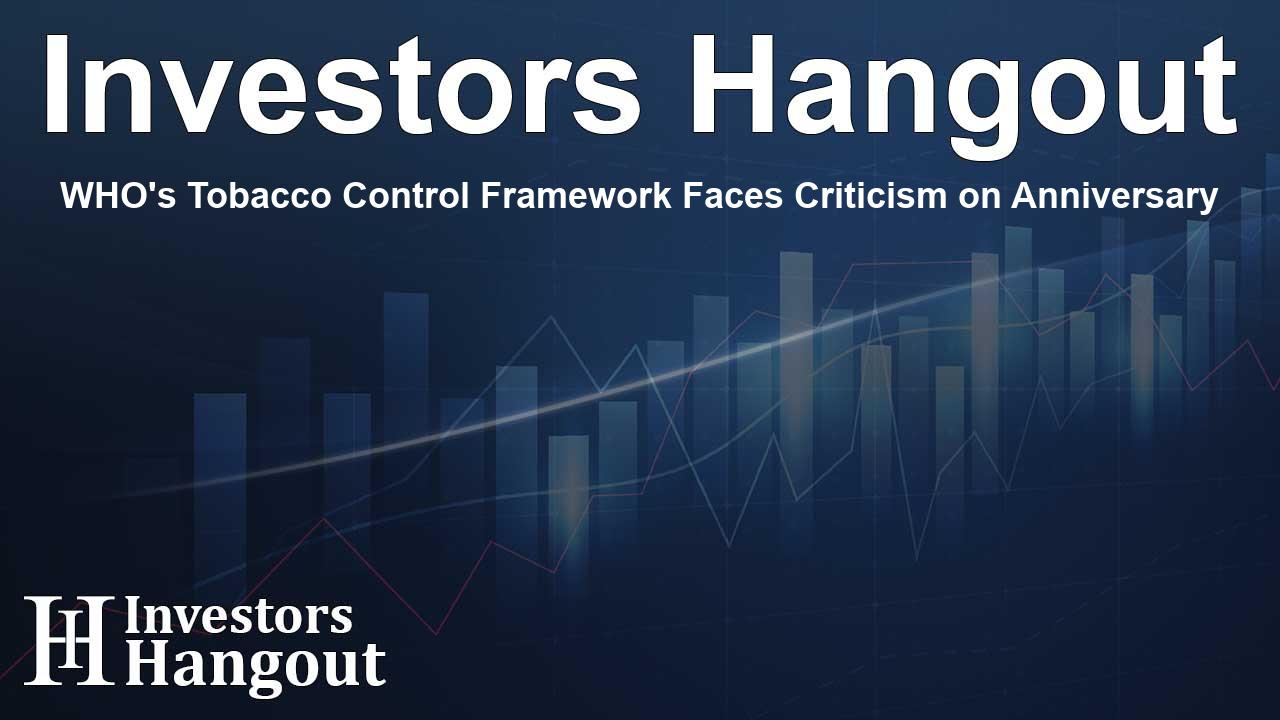WHO's Tobacco Control Framework Faces Criticism on Anniversary

WHO's Tobacco Control Framework Under Scrutiny
As the World Health Organization (WHO) commemorates the 20th anniversary of its Framework Convention on Tobacco Control (FCTC), this milestone has surprisingly ignited a wave of criticism from health experts and advocates. Rather than celebrating success, a recent panel organized by the Taxpayers Protection Alliance (TPA) reflected on missed opportunities and the stands taken against innovative tobacco harm reduction measures.
Critical Voices Advocate for Change
Clive Bates, a former director of Action on Smoking and Health (UK), emphasized that the FCTC was meant to be a pivotal change in global tobacco control. Unfortunately, he asserts, the WHO remains firmly attached to outdated policies, opposing safer alternatives like vaping and nicotine pouches that could help smokers quit. Bates's remarks highlight a significant disconnect between WHO's policies and modern understanding of harm reduction.
The Ongoing Toll of Tobacco
Despite the treaty's original goals to mitigate smoking-related harm, the global statistics remain alarming. Over a billion people continue to smoke, with more than eight million dying each year from tobacco-related ailments. Critics of the WHO's strategy argue that rejecting harm reduction approaches not only fails to consider scientific evidence but also endangers public health by disregarding pragmatic solutions.
Calls for WHO Accountability
Roger Bate from the International Center for Law and Economics added further weight to the discussion by questioning the institution's credibility across various public health issues. He called for essential reform within the WHO, suggesting that without adaptation to new scientific evidence and solutions, the organization risks irrelevance.
Concerns Over Current Policies
David Williams, president of TPA, echoed these concerns, deeming the WHO's current stance 'dangerous' and lacking responsibility. He referenced the growing body of research supporting the effectiveness of e-cigarettes and nicotine pouches in reducing harm to smokers. Williams argued that taxpayer-funded solutions should be recognized rather than dismissed without justification, calling the WHO's approach a form of negligence.
Global Campaign for Change
As part of its initiatives, TPA has launched a campaign named Good COP/Bad COP, which began during the 2024 FCTC COP10 meeting. The campaign is intended to maintain pressure on the WHO and advocate for accountability, with events planned in Geneva for future dialogues. Williams noted the importance of unity among doctors and advocates to ensure the WHO prioritizes public health.
Frustration with the Status Quo
Martin Cullip, an international fellow at TPA's Consumer Center, shared the panel's disillusionment, stating that the initial promise of the FCTC had devolved into a frustrating loss of potential advancement due to rigid ideologies. He emphasized the urgent need for the WHO to reevaluate its approach and embrace harm reduction as a crucial part of tobacco control policies.
Final Appeals for Ethical Leadership
As Clive Bates concluded, the WHO's leadership must reassess their priorities. He characterized the organization's ongoing approach as unethical and ineffective, calling for an alignment with scientific evidence. Bates urged that if the WHO strives to genuinely save lives, harm reduction must be integral to their future strategies.
Frequently Asked Questions
What is the FCTC?
The Framework Convention on Tobacco Control is a treaty by the WHO aimed at reducing tobacco-related harm globally.
Why is the WHO facing criticism?
Critics argue that the WHO promotes outdated policies and fails to acknowledge harm reduction strategies that could save lives.
What alternatives to smoking are being discussed?
Safer alternatives such as vaping, heated tobacco products, and nicotine pouches are being promoted as effective tools for smoking cessation.
What is TPA's role in this discussion?
The Taxpayers Protection Alliance organizes panels and campaigns to advocate for harm reduction and accountability from the WHO.
Is there a campaign related to tobacco control?
Yes, TPA has initiated the Good COP/Bad COP campaign to influence WHO policies regarding tobacco control and harm reduction.
About The Author
Contact Ryan Hughes privately here. Or send an email with ATTN: Ryan Hughes as the subject to contact@investorshangout.com.
About Investors Hangout
Investors Hangout is a leading online stock forum for financial discussion and learning, offering a wide range of free tools and resources. It draws in traders of all levels, who exchange market knowledge, investigate trading tactics, and keep an eye on industry developments in real time. Featuring financial articles, stock message boards, quotes, charts, company profiles, and live news updates. Through cooperative learning and a wealth of informational resources, it helps users from novices creating their first portfolios to experts honing their techniques. Join Investors Hangout today: https://investorshangout.com/
The content of this article is based on factual, publicly available information and does not represent legal, financial, or investment advice. Investors Hangout does not offer financial advice, and the author is not a licensed financial advisor. Consult a qualified advisor before making any financial or investment decisions based on this article. This article should not be considered advice to purchase, sell, or hold any securities or other investments. If any of the material provided here is inaccurate, please contact us for corrections.
